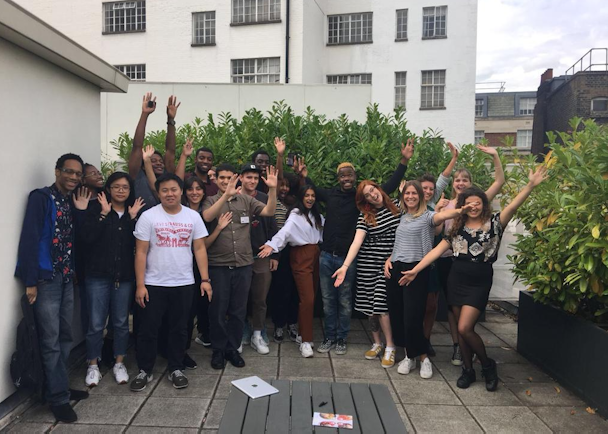Brixton Finishing School reflects on 5 years of diversifying advertising
On its fifth anniversary, graduates and founders of the ad school look back at its impact and explain why the current financial crisis threatens that work.

Ally Owens says barriers must be removed to get diverse voices into adland/ Image via Brixton Finishing School
Five years ago this month The Brixton Finishing School was founded to help people from backgrounds under-represented in advertising and marketing to find work in the industry. To mark its anniversary, we caught up with founder Ally Owen and program grads from across the years to hear about the role it has played in their development.
Before joining Brixton Finishing School (BFS), Selin Clayton (who is now an associate strategist at Superunion) says her view of the industry was that it lacked diversity. “And while that’s true to an extent, seeing how eager people are to be involved with the program provided a sense of hope,” she says.
Advertisement
Since BFS was born, founder Ally Owen says austerity and Covid have meant “a less inclusive landscape” has emerged as fees and costs have racked up.
“A ’university’ style education has become unaffordable for the nonaffluent, whose voices we so desperately need to enrich our teams and produce best in class work – class pun intended,” she says. ”This is why we have made it our mission to build alternative, free and inclusive routes into the industry.”
Owen feels the current cost of living crisis is now destroying hard worked for (expensive and elevating) educational opportunities for those not born into affluent families.
The situation is indeed dire. Students in the UK face working multiple jobs and even visiting food banks in the coming academic year as rising inflation erodes the value of loans and grants. One in three students are living on £50 or less a month after paying rent and bills.
Owens says: “If we continue to see only ’paid for’ routes as gateways into the industry, then we are going to miss out on a multitude of different voices and brilliance, and we will compound the class lop-sidedness in our workplaces. We need to unite to remove barriers in the face of the cost of living crisis that’s creating them. Fund the free gateways for the many, not the few.”
Advertisement
Clayton says her biggest hope for this period is that businesses have learned to ramp up their marketing efforts rather than slashing them through an economic crisis, allowing for secure jobs. However, the challenges lie within the extreme cost of living crisis.
“Starting a junior position in a major city, without inflated salaries, creates extra burdens for young people. It also has the potential to discourage those about to choose their future career paths, leading them to choose more traditionally lucrative industries.”
David Boateng is another BFS graduate. He says that young creatives making their first forays into advertising are increasingly taking on multiple roles in an attempt to gain experience and prop up their incomes.
“Young people will always find their way of making power moves in a city like London, where there is a plethora of opportunity. Nowadays, many people don’t put all their eggs in one basket as it’s not sustainable any more in this current climate.”
Suggested newsletters for you
Owens is also worried that the flattening of entry level salaries for people in full-time roles is excluding them from social mobility. “The rise in rents, food and energy create a perfect storm for those with debt and only their income to rely on,” she says.
“The second job will become much more normal in the first couple of years of industry work to offset low earnings. I can empathize with this position – when I first broke in I was, well, broke. I worked an evening and a weekend job on top of ’industry role’ in my early years. I normalized this as I’d always been told I’d have to work harder to get by – I was always unwell, always tired and always scared of not reaching the month’s end with enough cash. I don’t feel I’ve ever escaped this fear of not getting by.”
Looking to the future, Clayton says she hopes more people from different backgrounds will feel able to join the industry. “Employers should remain flexible in approaches to work, allowing for agency and self-starting opportunities.”
However, the cost of living crisis looms large in the foreground for workers at the start of their careers. Clayton says she would love to see agencies reconsider what their perks and policies are doing to meaningfully support entry-level staff.
“Is a loan for a yearly travel card really an incentive when it’s more affordable to work from home? Is health coverage attractive if mental health isn’t covered within that? Providing benefits that actually provide wellbeing may be a better safeguard to the future of the workforce.”
Owens equally implores agencies to pay staff “what is fair in the current climate, not what you can get away with to make more profit“. “If you’ve ever stated that your company backs its staff’s mental wellness, then just remember that fair pay is fair play.”

